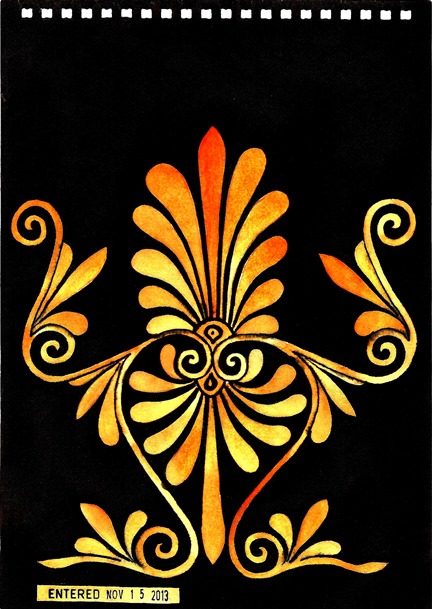tr. by David Larsen at 2:57 PM
Labels: Greek poetry , Secondary literature
tr. by David Larsen at 8:10 PM
Labels: Arabic poetry
A flute pours out its woes with a plaintive sob, to the
tumult of the bows and strings. And the rose is laughing.
It is a breezy day's debut into the bloom of spring,
highlit like a bride's outfit in pearls and gold.
The revels of night become day-drinks. Frivolity keeps
[the cup] going round in the same order, whether
willed [by the drinker]
or pressed upon him. Were we heated! I swear, it was
the sun's own beams that swirled in our cup and
heated us.
The people were a brotherhood of truth. The tie uniting
them was a love surpassing kinship by descent.
Nursed together on the squirting stream of a pale pink
[quantity of wine], each gave his fellow nursling
his due,
and the drunken man's offense was not held against him.
No doubt about their character need trouble you.
The best teachers are the days themselves, and time's
long stretches, and those moments when
defects of fortune are overturned.
tr. by David Larsen at 11:02 AM
Labels: Arabic poetry
tr. by David Larsen at 12:23 AM
Labels: Greek prose
Ambrosius (who supplied our Adamantius aux organes splanchniques du bronze with the parchment, copyists, and funds that made it possible for him to produce his innumerable commentaries), remarks in a letter written from Athens that he had eaten no meal in Origen's company without something being read aloud, nor lain in his guest-bed unaccompanied by a reading from Scripture by one of the brethren, whose readings and prayers followed in continuous succession day and night.
We creatures of the belly, did we ever thus? We who yawn, and rub our eyes, and can barely contain our annoyance after one hour of reading? Then, as if after some great task, we go back to involvement with the business of the world. I say nothing of the heavy meals that depress our faculties, and am ashamed to mention the time lost each day to anticipation of visitors, or the visits we pay to others—when straightaway the prattle starts, and our words are wasted on tearing apart third parties. In dissecting the lives of others, we bite and in turn are bitten, and even as we take our leave we are busy chewing.
When friends have all gone home, our minds keep working. Now resentment makes a lion's face to flash across our own; now plans run through our minds in obsessive bursts, heedless of the Gospel's warning: "Tonight your dumb ass will be stripped of your life/soul. Who do your stored-up goods belong to then?"
Jerome, Letter 43 (To Marcella, in praise of country life)
tr. by David Larsen at 8:12 AM
Labels: Latin prose
 From a terracotta bell-krater (ca. 465-460 BCE) attributed to the Altamura Painter.
Museo Archeologico Nazionale, Ferrara
From a terracotta bell-krater (ca. 465-460 BCE) attributed to the Altamura Painter.
Museo Archeologico Nazionale, Ferrara
Between judgment by analogy (qiyās) and independent reasoning (ijtihād), the difference is as follows. Analogy is the act of holding one thing against another in view of some likeness adjudged between them. Others say that it is the imposition of one's judgment of the former thing upon the latter by virtue of a perceived likeness. Abū Hāshim al-Jubbā’ī, may God have mercy on him, defined it as "holding one thing against another and imposing one's judgment of the latter upon the former," explaining that a standardized measurement is for this reason called an "analogical implement" (miqyās): whatever one wants measured must be held against it. In this way, the shoemaker's template used for matching soles to one another is called a miqyās.
Qiyās therefore refers exclusively to the use of one thing in order to make a judgment about another thing, and its root verb qāsa yaqīsu is used in this same sense. Mere likeness between two things is not analogy; qiyās is not said unless the two are correlated such that a judgment incumbent upon one is applied to the other. In this sense, God (be He exalted) might well be called al-Qāyis ("The Analogist"), for the likeness He enforces between the unbelieving and the dead (35:22), the believer and the living (36:70), unbelief and darkness (6:122) and belief and light (61:8).
Whoever defines analogy as "the abstraction of what is true from what is invalid" is way off. This may define something, but it can't be called analogy. Here is an example of analogy: "If a good person is susceptible to committing an offense that a wise man is not, then the good person is liable to a penalty that the wise man is not." In the parlance of legal scholars, it is to hold a "branch" [i.e. the case under consideration] against a "root" [a precedent case whose judgment is secure] in order that the rationale of the latter ruling be applied to the former.
The original meaning of ijtihād is "utmost exertion." One can be said to "exert one's utmost" in carrying a stone, but in carrying a date pit there is no exertion. Theologians define it as the process that determines the preponderance of one opinion [above all others] in matters that call for judgment, such that all who practice it will reach the same conclusion. And their reference to statements by "the people of qiyās" and "the people of ijtihād" proves that these methods are not the same. Analogy is more specialized than ijtihād, which includes analogy and other methods besides. [Even so,] al-Shāfi‘ī says that ijtihād and analogy are the same thing; according to his definition, ijtihād means applying the rationale of legal precedent to the exclusion of all else. Legal scholars define it as exerting one's utmost in figuring out how the law applies to a given situation, in a way that is neither obvious nor coeval with the law's original intent.
This is what Mu‘ādh ibn Jabal meant by saying: "I will exert my utmost to reach an opinion (ajtahidu ra’yī) in those cases wherein I find no answer in the Qur'ān or sunna." "Opinion" (ra’ī) here is the outcome of deduction and analogy applied toward legal judgment. ‘Umar ibn al-Khaṭṭāb [once reprimanded a scribe who concluded a legal brief with the words: "This is the opinion of God and ‘Umar." Seizing the document, he crossed them out and] wrote: "This is the opinion of 'Umar." And ‘Alī, peace be upon him, once said: "My opinion and the opinion of 'Umar is that [slave women who have borne children to their masters] must not be sold." Those who denigrate opinion are refuted by these statements, which uphold the validity of rulings based on rationale and report, when these have been tested against an opposing view.
Ijtihād is said only for reasoning applied to legal matters. [...] The study of physics cannot be spoken of as a form of ijtihād in the way that ijtihād is applied to inheritance law. Nor is ijtihād applicable to calculations like how many five-dirham shares are in a hundred dirhams, where there is no difference of opinion. Qiyās, on the other hand, is applicable to a variety of intellectual pursuits. The difference between them is therefore clear.
Abū Hilāl al-‘Askarī, The Book of Lexical Distinctions
tr. by David Larsen at 11:15 PM
Labels: Arabic prose

tr. by David Larsen at 7:37 PM
Labels: Arabic prose
Al-Ḍabu‘ is the female; the male is called al-ḍib‘ān and al-dhaykh. Among its other names are:
Haḍājir "Whose Gut Is Huge"
Jay’al "The Female Hulk"
Ja‘āri "Craps-a-Lot"
Qasāmi "Divider-up [of Carcasses]"
Naqāthi "Bone-Sucker," from its [habit of] extracting marrow from
bones, as in the anonymous rajaz verse:
Jā’at Naqāthi taḥmilu 'l-birdhawnā
"Along came Bone-sucker, carrying [part of?] an old horse..."
al-‘Arfā’, for the length of its ‘urf [which is its mane]
al-‘Athwā’ "The Bearded Lady," for the denseness of its hair
al-‘Arjā’ "Whose Gait is Limping"
al-Khāmi‘a "Whose Gait is Loping"
Umm Hinbir "Mother of the Flesh-Tearer"
Umm Khannūr "Mother of the Anus," also Umm Khunnūr
The hyena pup is called fur‘ul. The hyena's den is a wijār.
The offspring of hyena and the wolf is called al-Sim‘ "The Sharp-Eared" (?) and Abū Sabara "Father to the Wound-Prober." Dissenting opinion holds that the sim‘ is a cross between wolf and dog, and that the offspring of wolf and hyena is called al-‘Usbūr.
From The Rudiments of Lexicography by al-Khaṭīb al-Iskāfī
tr. by David Larsen at 7:19 PM
Labels: Arabic lexicography
tr. by David Larsen at 10:32 PM
Labels: Greek poetry , Lost works